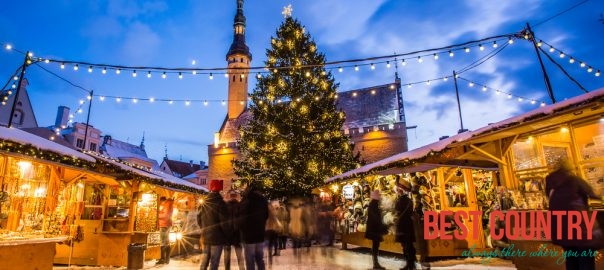Public holidays in Estonia

It is always such a bummer when one of the holidays appears to be in the weekend. You know the feeling.
Here is the list of the public holidays we celebrate in Estonia, some notes and explanations:
New Year's Day (Estonian 'Uusaasta'), 1st of January. An international holiday, no differences between the one in Estonia or, say, in France or Canada.
Independence Day (Estonian 'Iseseisvuspäev'), 24th of February. It is basically a celebration of the declaration of Independence (= Manifesto to the Peoples of Estonia) in 1918.
During World War I, between retreating Russian and advancing German troops, the Occupation of Estonia by German Empire nearing, the Salvation Committee of the Estonian National Council declared the independence of Estonia on 24 February 1918. However, the German forces did not recognize the independence.
After the German Revolution, between 11 and 14 November 1918 the representatives of Germany formally handed over political power in Estonia to the national government.
The Republic of Estonia obtained international recognition and became a member of the League of Nations in 1921.The independence period was one of great cultural advancement. Estonian language schools were established, and artistic life of all kinds flourished.
One of the more notable cultural acts of the independence period, unique in western Europe at the time of its passage in 1925, was a guarantee of cultural autonomy to minority groups comprising at least 3,000 persons, including Jews.
Good Friday (Estonian 'Suur Reede'), moveable Friday. An international religious holiday. Funny enough, Estonia is recognized as the least religious country in the world, we still celebrate Good Friday. Moreover, we got some traditions we (sometimes) follow.
For example, there is not allowed to do any work this day (for example laundry or room cleaning), dance or sing, or receive guests.
The main food for this day is porridge, peas or beans, fish, berries or apples. Me personally don't follow any rules. I would say, only very old Estonians could still follow some traditions. Although, me and my family try not to work and spend a day as lazy as possible
Easter Sunday (Estonian 'Ülestõusmispühad'), moveable Sunday. Let's say, it's Good Friday's afterparty.
May Day (Estonian 'Volbripäev'), 1st of May. Another international day, an ancient northern hemisphere spring festival. It's name takes from Saint Walpurga, who was an English missionary to the Frankish Empire.
The "witches' sabbath" Walpurgis Night occurs on the eve of her day, which coincides with May Day. I am pretty sure, nobody knows the meaning of May Day, but celebrations among the younger generations take place on May Day Eve, see Walpurgis Night (Estonian 'Volbriöö'), which looks just like well-known Helloween in the United States.
Influenced by German culture, the night originally stood for the gathering and meeting of witches. Modern people still dress up as witches to wander the streets in a carnival-like mood.
Whitsunday (Estonian 'Nelipüha'), moveable date. Let's day, none of us, including me, knew about the existence of this holiday. It is religious, it is somehow boring, and it takes place on the weekend. Who cares? Right?
Victory Day (Estonian 'Võidupüha'), 23rd of June. It celebrates the victory in the Battle of Võnnu during the Estonian War of Independence.
After heavy fighting Estonian forces repelled German attacks and went on full counter-attack. I think it's a worth day to celebrate. Unfortunately for many people living in Estonia this day means nothing as the celebrate the following holiday, which is the biggest holiday a year!
Midsummer Day (Estonian 'Jaanipäev'), 24th of June. Midsummer may simply refer to the period of time centered upon the summer solstice. European midsummer-related holidays, traditions, and celebrations are pre-Christian in origin.
They are particularly important in Northern Europe - Sweden, Norway, Denmark, Estonia, Finland, Latvia and Lithuania. In Sweden, Finland and Estonia, Midsummer's Eve is considered the greatest festival of the year, comparable only with Walpurgis Night, Christmas Eve, and New Year's Eve.
Jaanipäev was celebrated long before the arrival of Christianity in Estonia. In 1578, Balthasar Russow wrote in his Livonian Chronicle about Estonians who placed more importance on the festival than going to church.
He complained about those who went to church, but did not enter, and instead spent their time lighting bonfires, drinking, dancing, singing and following pagan rituals. Some of the rituals of Jaanipäev have very strong folkloric roots.
The best-known Jaanik, or midsummer, ritual is the lighting of the bonfire and jumping over it. This is seen as a way of guaranteeing prosperity and avoiding bad luck. Likewise, to not light the fire is to invite the destruction of your house by fire.
The fire also frightened away mischievous spirits who avoided it at all costs, thus ensuring a good harvest. So, the bigger the fire, the further the mischievous spirits stayed away.
Day of Restoration of Independence (Estonian 'Taasiseseisvumispäev'), 20th of August. Yep, after we got our independency, we lost it. And then got it again.
That's what this day is all about. This time from the Soviet Union. Through a strict, non-confrontational policy in pursuing independence, Estonia managed to avoid the violence which Latvia and Lithuania incurred in the bloody January 1991 crackdowns and in the border customs-post guard murders that summer.
Christmas Eve (Estonian 'Jõululaupäev'), 24th of December. Same as everywhere else.
Christmas Day (Estonian 'Esimene Jõulupüha'), 25th of December. Same as everywhere else.
Boxing Day (Estonian 'Teine Jõulupüha'), 26th of December. Same as everywhere else.
We also have some national days or days every family celebrates, but they are more unofficial.